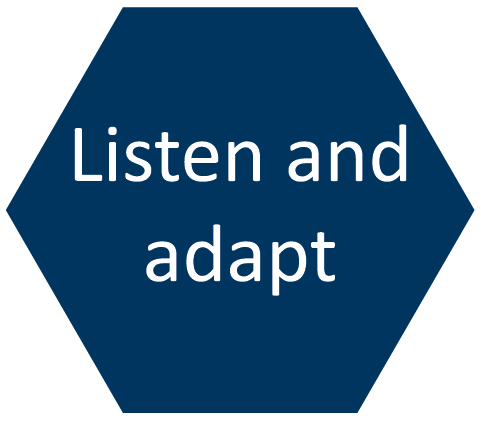Sexual Violence Prevention
- Sexual Violence Prevention Home
- Sexual Violence Prevention Network (SVPN)
- Sexual Violence Data
- Communities First
- Domestic Violence and Sexual Assault Prevention
Related Sites
Domestic Violence and Sexual Assault Prevention Grant Program
Domestic violence and sexual assault affect different communities in different ways. Prevention efforts must be driven by the community and relevant to community culture to be most effective.
In 2019, the Minnesota State Legislature appropriated $750,000 for two years starting in 2020 for the Domestic Violence and Sexual Assault Prevention Program, to fund projects that use community-driven and culturally relevant practices to prevent domestic violence and sexual assault. The grant program sought to engage communities that had not been reached by traditional domestic and sexual assault prevention efforts.
The MDH Sexual Violence Prevention Program collected input from community members to inform the Request for Proposals and review process. After considering the final scores, comments from reviewers, target populations, and geographic areas served, MDH selected six applicants for funding:
- Lao Assistance Center in collaboration with Asian-Pacific Islander (API) Women’s Health Coalition
- SEWA-AIFW, Inc.
- Somali Community Resettlement Services in collaboration with Healing, Outreach, Prevention and Education (HOPE) Center
- Upstream Arts
- Women of Nations
- Women’s Initiative for Self-Empowerment
Funded Activities
Activities were consistent with Centers for Disease Control and Prevention recommended strategies to prevent sexual and domestic violence:
- Promote social norms that protect against violence
- Teach healthy relationship skills
- Engage influential peers and adults
- Provide opportunities to empower and support girls and women
- Create protective environments
- Support victims/survivors
Factors Addressed
Activities focused on key risk and protective factors for sexual and domestic violence:
- Reduce harmful social norms
- Increase skills in solving problems non-violently
- Strengthen coordination of resources and services among community agencies
- Promote cultural and spiritual practices
- Increase connectedness
Best Practices Recommendations from Grantees
The grant program was evaluated to identify best practices for community-driven and culturally relevant domestic violence and sexual assault prevention. While all grantees identified unique approaches to prevention, there were four consistent best practice themes that emerged.
 Collaborate
Collaborate
“Relationships built through this grant provided several resources I wouldn’t have had before.” – Somali Community Resettlement Services
Collaborating across sectors and with community-specific organizations has the potential to improve prevention programs to better serve communities in a culturally relevant way.
 Listen and adapt
Listen and adapt
“Consider the diversity of learners present by incorporating multiple ways for participants to choose to interact with the materials and learn” – Upstream Arts
All grantees found that their programming had to be flexible and adaptable to best meet the needs of the communities they were serving. Grantees used strategies that were flexible in nature, and could be adapted over time given feedback from participants
 Use a holistic approach
Use a holistic approach
“Most community members that we are working with are still first-generation immigrants and are more familiar with a traditional health care model where one health issue is seen as affecting part of the larger self, including emotional and spiritual health, and addresses their relationship between the individual and the community that supports them.” – Lao Assistance Center
Using a holistic approach to health that incorporates mental, social, and spiritual health is a strategy that many grantees used to reach their communities. This strategy can make domestic violence and sexual assault prevention more approachable, and it also represents a more traditional way of approaching health that may be more culturally relevant to many Native, Immigrant, and Refugee communities.
“The sole purpose isn’t to sit and talk about this heavy thing, there is something else they can bond with peers about.” – SEWA-AIFW
 Ensure equitable access
Ensure equitable access
“These concepts are newer and sometimes there aren’t words for it in a certain language so they need to explain it so they understand.” – Women’s Initiative for Self-Empowerment
Grantees were working with communities who have cognitive and physical disabilities, communities who have limited English proficiency, and communities who have been mistreated by mainstream power structures and systems. To best serve these communities, access had to be a consideration in every part of their work.
“Thinking about who the messenger is. I’m trusted in a way that someone who isn’t native wouldn’t have the same kind of trust and respect.” – Women of Nations
Legislative reports
As required by the legislation, MDH submitted the first Legislative Report for Domestic Violence and Sexual Assault Prevention Grant Program, 2020 (PDF) in February 2020, and a second Legislative Report for Domestic Violence and Sexual Assault Prevention Grant Program, 2022 (PDF) in February 2022. These reports describe the organizations that received grant funds, the number of people served by the grant program, a description and analysis of the practices implemented, and best practice recommendations to prevent domestic violence and sexual assault.
